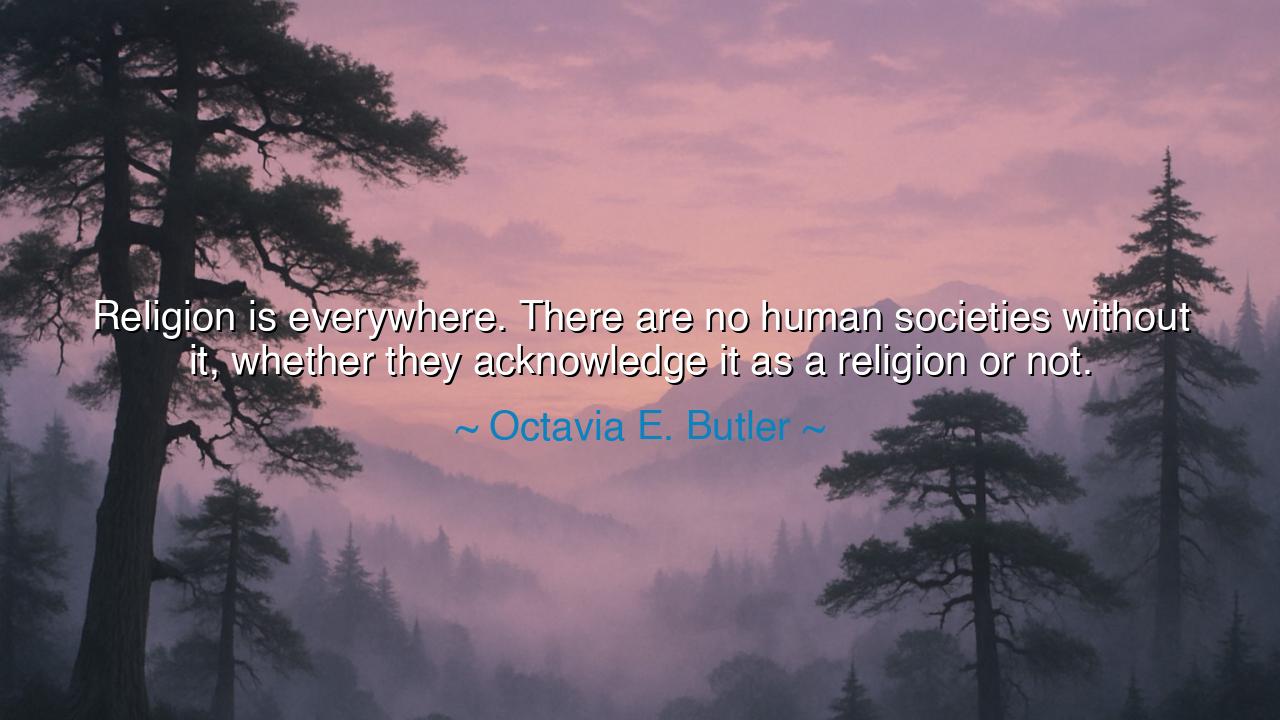
Religion is everywhere. There are no human societies without it
Religion is everywhere. There are no human societies without it, whether they acknowledge it as a religion or not.






“Religion is everywhere. There are no human societies without it, whether they acknowledge it as a religion or not,” wrote Octavia E. Butler, the seer of speculative worlds, whose wisdom cut through the boundaries of time and tribe. Her words are not the musings of dogma, but a profound observation of the human condition — that wherever people gather, belief takes root. It may wear the robes of theology or the garments of ideology, but it is always there, whispering to the soul, binding hearts, shaping destiny. Butler reminds us that religion, in its truest sense, is not confined to temples or texts; it is the rhythm by which the human spirit seeks meaning in the vastness of existence.
The origin of this quote arises from Butler’s lifelong study of humanity’s moral evolution — a theme that courses through her works like a living current. She, who wrote of gods born from human hands and faiths that remake worlds, understood that belief is not optional for humankind. Every civilization, from the dawn of fire to the age of stars, has woven around itself some sacred pattern to explain life and death, joy and suffering. Even those who claim no religion still worship — not always a deity, but an idea, a cause, a vision of order. To Butler, this instinct is not weakness; it is the proof of our yearning — that we are creatures who must believe in something greater than ourselves, or we will perish in the emptiness of disbelief.
To say that religion is everywhere is to recognize that faith is not limited to the churches of Christ, the mosques of Islam, or the temples of old gods. It lives in the rituals of daily life, in the unspoken codes of nations, in the quiet prayers of those who do not even know they are praying. The scientist who devotes a life to uncovering truth, the artist who pours soul into creation, the mother who believes her child’s life is sacred — all are guided by faith, though they name it differently. Humanity cannot escape worship, for even in denying the divine, we make gods of reason, wealth, or progress. Wherever people seek meaning, there lies religion, in its most elemental form.
Consider the story of the ancient Egyptians, whose lives were ruled by the sacred order of Ma’at — the principle of truth and balance that governed the universe. To them, every sunrise was divine renewal, every act of justice a holy offering. They built temples not only of stone but of thought, binding morality, art, and politics into a single spiritual vision. Yet millennia later, though the gods of Egypt have faded from worship, their impulse remains — reborn in modern institutions, in moral systems, in the human belief that life must have purpose. In this, Butler’s insight resounds across time: religion evolves, but it never disappears. It is the eternal reflection of humanity’s hunger for order and meaning.
Butler’s words also challenge the arrogance of modernity — the belief that reason alone has replaced faith. For she saw that even secular societies craft their own sacred myths. The worship of progress, the cult of technology, the dogma of politics — these, too, are religions in disguise, complete with prophets, rituals, and heresies. The modern world bows to the god of the market, prays to the idols of celebrity, and fears the apocalypse of climate or war. We have changed the names of our deities, but not our nature. The heart still kneels. The soul still yearns. Humanity remains, as ever, a spiritual creature, bound to seek the infinite, whether in heaven or in the mirror.
There is a strange beauty in this truth. For it means that no matter how far we travel — to the edge of the earth or the stars — we carry the sacred with us. It lives in our stories, in our art, in the simple act of awe before the unknown. Religion, in Butler’s sense, is not merely a system of belief, but a pulse within the species — the fire Prometheus stole for our awakening. It teaches us that even amid chaos, we still believe in purpose; even in despair, we still reach for hope. To deny this is to deny what makes us human.
So, dear listener, what lesson shall we draw from this? It is this: guard your beliefs, but do not worship them blindly. Recognize the sacred wherever you find it — in faith or in doubt, in temple or in laboratory. Ask not whether you are religious, but what it is that you worship, for whatever commands your time, your loyalty, your heart — that is your god. Be mindful, then, of what altar you bow before. Make your religion one of compassion, curiosity, and truth.
And when you walk through the world, remember Butler’s wisdom: religion is everywhere because the divine spark is within you. Every act of kindness, every pursuit of knowledge, every moment of wonder is part of that eternal dialogue between humanity and the infinite. Live not as one who denies faith, but as one who understands that life itself — fragile, fleeting, and miraculous — is the greatest act of belief there is.






AAdministratorAdministrator
Welcome, honored guests. Please leave a comment, we will respond soon